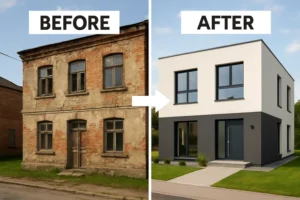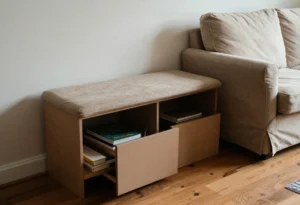Imagine walking into your home and seeing not just the walls and furniture that make up its interior, but an untapped financial potential waiting to be unleashed. Through strategic home improvements, your living space can be transformed. It can potentially enhance not only its aesthetic appeal but also its market value.
This transformation is like planting seeds in a garden, where the efforts and investments you make today flourish into substantial returns tomorrow. It’s about seeing beyond the immediate, recognizing the long-term benefits that lie in upgrading and refining your home, and turning it into an instrument for financial growth and stability.
Understanding Home Value
The value of your home encompasses far more than a mere figure on paper. It represents the culmination of various elements that collectively determine its desirability and worth in the eyes of potential buyers and the real estate market.
- Location: It’s an old but gold real estate mantra for a reason. Your home’s proximity to essential amenities, quality schools, and convenient transportation links can significantly influence its attractiveness and value. A prime location can elevate a property’s worth substantially, making it a crucial aspect to consider for both buying and selling.
- Size and Layout: The square footage of your home, along with its layout, directly impacts its valuation. Spacious homes with practical, open floor plans generally fetch higher prices on the market.
- Condition and Age: The overall state of your home, including how well it has been maintained and the age of its construction, affects its value.
- Market Trends: The broader economic environment and specific trends within the real estate market also play a critical role in determining your home’s value. Fluctuations in demand, interest rates, and the local housing supply can all be influential.
The financial benefits of an increased home value are manifold, offering homeowners a powerful avenue to enhance their overall financial health. Higher home equity means more borrowing power for homeowners, potentially leading to better rates and terms on loans and credit lines. Additionally, should you decide to sell, a higher home value translates into greater profit, providing substantial capital that can be reinvested, saved, or used to improve your lifestyle.
Much like receiving a checking account bonus, elevating your home’s value can significantly expand your financial leverage and options, enriching your financial toolkit. For those curious about the intricacies of financial bonuses, learn more about how you can sign up and the promotions you can take advantage of. Such bonuses can even provide additional funds for your home improvement projects.
Home Improvements with the Best Return on Investment (ROI)

When considering upgrades to your property, not all home improvements are created equal. Some renovations can significantly increase your home’s value and attract more interest from potential buyers, should you choose to sell in the future.
- Minor Kitchen Remodel: Often considered the heart of the home, the kitchen plays a critical role in a home’s overall appeal and value. A minor remodel, such as updating appliances, refinishing surfaces, and upgrading lighting, can offer a substantial return without the extensive costs of a full renovation.
- Bathroom Renovation: Updating a bathroom can significantly enhance a home’s functionality and aesthetic appeal. Even small changes, like replacing fixtures, updating lighting, and adding a fresh coat of paint, can yield a high ROI.
- Energy-Efficient Upgrades: Investing in energy efficiency is not only good for the environment but also appealing to today’s eco-conscious buyers. Simple upgrades like installing energy-efficient windows, adding insulation, and upgrading to high-efficiency heating and cooling systems can reduce utility bills and increase your home’s value.
- Adding Usable Space: Converting unused space into functional living areas, such as finishing a basement or adding a deck, can significantly increase your home’s square footage and appeal. These types of improvements often recoup a large portion of their cost in the home’s resale value.
- Exterior Improvements: First impressions matter, and the exterior of your home is the first thing potential buyers see. Projects like repainting the exterior, updating the front door, and enhancing the landscaping can improve curb appeal and, by extension, the value of your home.
- Smart Home Technology: Incorporating smart home technology, such as thermostats, security systems, and lighting, can make your home more attractive to buyers looking for modern conveniences. These technologies not only improve the quality of life but can also be a selling point.
Financial Planning for Home Improvements
Embarking on home improvement projects requires not just a vision for your space but also a strategic financial plan to bring that vision to life. Navigating the financial aspects of renovations can be daunting, yet with the right approach, you can enhance your home’s value without compromising your financial stability.
- Budgeting for Projects: The first step in any home improvement plan is to establish a realistic budget. Assess your finances to determine how much you can afford to spend without overextending yourself. Remember to include a buffer for unexpected expenses, which are common in renovation projects.
- Assessing Cost Versus Value: Not every renovation will offer a return on investment, so it’s crucial to weigh the cost of each project against the potential increase in home value. Prioritize projects that are likely to enhance your property’s appeal and functionality to future buyers.
- Timing of Home Improvements: The timing of your renovations can also impact your financial planning. For instance, undertaking projects during the off-season for contractors may result in cost savings. Additionally, consider the current state of the real estate market; if values are rising, your investment could see quicker returns.
- Financing Options for Home Improvements: Not everyone has the cash on hand to cover the costs of significant home upgrades. Fortunately, there are several financing options available:
- Home Equity Loans and Lines of Credit (HELOC): Leveraging the equity in your home can be a cost-effective way to finance improvements, typically offering lower interest rates than personal loans.
- Personal Loans: For those without substantial home equity or who prefer not to use their home as collateral, personal loans can provide the necessary funds, though often at higher interest rates.
- Government Grants and Incentives: Depending on the nature of your project, you may qualify for government grants, especially for energy-efficient upgrades. These can help offset costs without needing to be repaid.
- Checking Account Bonuses: By opening a new account or meeting certain criteria with your existing bank, you might secure a financial bonus. While typically not as substantial as the amounts available through loans or grants, these bonuses can supplement your budget for smaller projects or cover the cost of materials for DIY upgrades,
Wrapping Up
Embracing home improvements as strategic financial investments can significantly amplify your property’s value and, by extension, your overall financial well-being. By carefully selecting projects with high ROI, planning your finances wisely, and leveraging the right opportunities, you transform your living space into a powerful asset. This journey not only enhances the quality and functionality of your home but also positions you for greater financial flexibility and security, making each renovation a step towards a more prosperous future.





